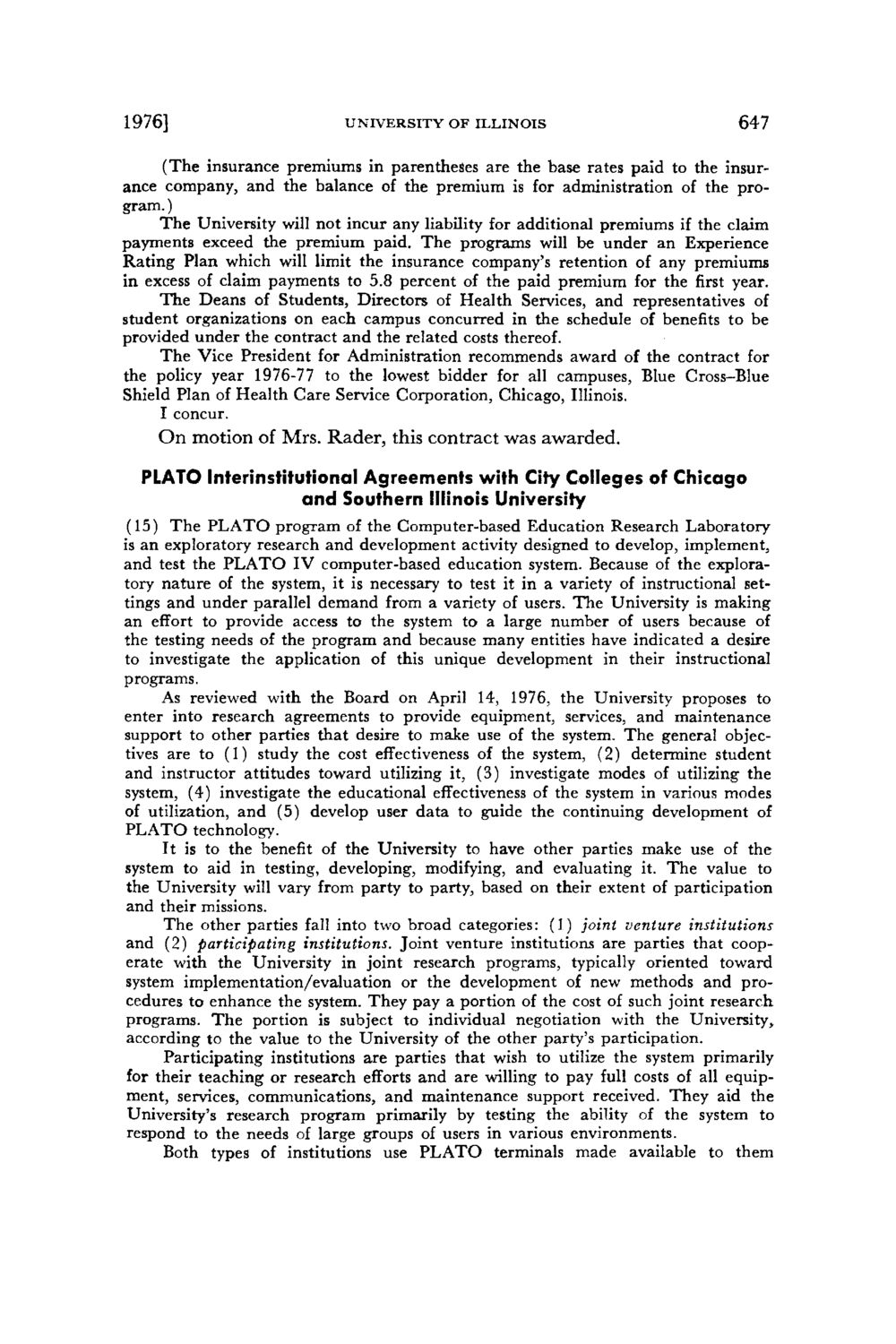| |
| |
Caption: Board of Trustees Minutes - 1976
This is a reduced-resolution page image for fast online browsing.

EXTRACTED TEXT FROM PAGE:
1976] UNIVERSITY OF ILLINOIS 647 (The insurance premiums in parentheses are the base rates paid to the insurance company, and the balance of the premium is for administration of the program.) T h e University will not incur any liability for additional premiums if the claim payments exceed the premium paid. The programs will be under an Experience Rating Plan which will limit the insurance company's retention of any premiums in excess of claim payments to 5.8 percent of the paid premium for the first year. The Deans of Students, Directors of Health Services, and representatives of student organizations on each campus concurred in the schedule of benefits to be provided under the contract and the related costs thereof. The Vice President for Administration recommends award of the contract for the policy year 1976-77 to the lowest bidder for all campuses, Blue Cross-Blue Shield Plan of Health Care Service Corporation, Chicago, Illinois. I concur. O n m o t i o n of M r s . R a d e r , this c o n t r a c t w a s a w a r d e d . PLATO Interinstitutional Agreements with City Colleges of Chicago and Southern Illinois University (15) The P L A T O program of the Computer-based Education Research Laboratory is an exploratory research and development activity designed to develop, implement, and test the P L A T O IV computer-based education system. Because of the exploratory nature of the system, it is necessary to test it in a variety of instructional settings and under parallel demand from a variety of users. The University is making an effort to provide access to the system to a large number of users because of the testing needs of the program and because many entities have indicated a desire to investigate the application of this unique development in their instructional programs. As reviewed with the Board on April 14, 1976, the University proposes to enter into research agreements to provide equipment, services, and maintenance support to other parties that desire to make use of the system. The general objectives are to (1) study the cost effectiveness of the system, (2) determine student and instructor attitudes toward utilizing it, (3) investigate modes of utilizing the system, (4) investigate the educational effectiveness of the system in various modes of utilization, and (5) develop user data to guide the continuing development of P L A T O technology. It is to the benefit of the University to have other parties make use of the system to aid in testing, developing, modifying, and evaluating it. The value to the University will vary from party to party, based on their extent of participation and their missions. The other parties fall into two broad categories: (1) joint venture institutions and (2) participating institutions. Joint venture institutions are parties that cooperate with the University in joint research programs, typically oriented toward system implementation/evaluation or the development of new methods and procedures to enhance the system. They pay a portion of the cost of such joint research programs. T h e portion is subject to individual negotiation with the University, according to the value to the University of the other party's participation. Participating institutions are parties that wish to utilize the system primarily for their teaching or research efforts and are willing to pay full costs of all equipment, services, communications, and maintenance support received. They aid the University's research program primarily by testing the ability of the system to respond to the needs of large groups of users in various environments. Both types of institutions use P L A T O terminals made available to them
| |